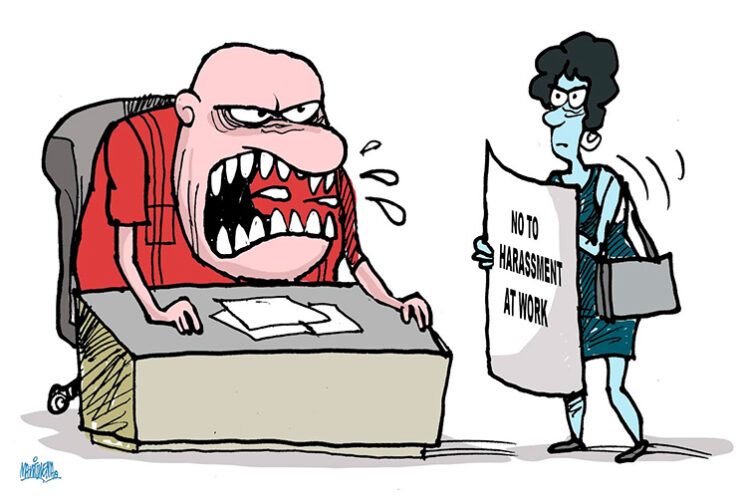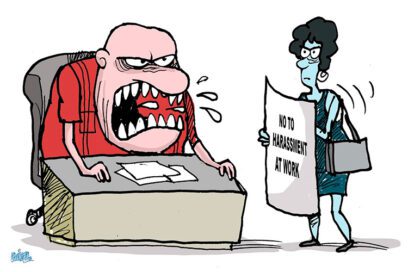Santiago de Cuba – Decree no. 96, which aims to address attitudes of harassment, violence and discrimination in the workplace, has been in force since September 2023, although there is a lack of knowledge and «a long way to go».
 This is the opinion of the workers and administrators interviewed by this newspaper, as well as of two legal experts we spoke with to shed light on the matter: Haymara Almaguer Torres, president of the Commercial, Labor and Social Security Chamber of the Provincial People’s Court of Santiago de Cuba, and Ediltrudys Verdecia Mock, judge of the Labor and Social Security Section of the Municipal People’s Court of the head town of this southeastern territory.
This is the opinion of the workers and administrators interviewed by this newspaper, as well as of two legal experts we spoke with to shed light on the matter: Haymara Almaguer Torres, president of the Commercial, Labor and Social Security Chamber of the Provincial People’s Court of Santiago de Cuba, and Ediltrudys Verdecia Mock, judge of the Labor and Social Security Section of the Municipal People’s Court of the head town of this southeastern territory.
According to the judges, harassment in general is «the relentless pursuit of a person and, from a legal point of view, in the workplace it occurs when the worker, employee or civil servant is subjected to threats, isolation, repeated and deliberate humiliation and other forms of mistreatment in circumstances related to his or her performance.
«In the Labor Code, Law 116 of 2013, and its regulation, Decree no. 326 of 2014, there is no definition of harassment as such. Until 2023, it had never been treated in this way by our legislation, so the aforementioned Decree 96 is undoubtedly a step forward,» Almaguer Torres continues:
«In order to analyze this manifestation in labor matters – it can be moral, psychological, sexual, persecuting or humiliating, sending letters or e-mails with offensive content, maintaining undue physical contact without the consent of the other person, immodest invitations in exchange for a benefit, both at the beginning and during the course of the labor relationship – the operators of the law are supported by our Constitution, in particular articles 40, 42, 48, 64 and 146 of the Labor Code.
Both lawyers agreed in emphasizing that any complaint or denunciation of harassment at work can be made by workers employed in both the public and private sectors, and Verdecia Mock explained the mechanisms established to enforce this right.
«The first thing is that in all entities there must be a protocol of action against violence, discrimination and harassment in the workplace; it is up to the union to strengthen its representative mission and be very careful to ensure that it is drafted and made known in assembly.
«The person who feels harassed files a complaint with the harasser’s immediate supervisor, and from that point on, there is an obligation to form a commission, conduct the appropriate investigations, and come to a conclusion.
«If you do not agree with the decision of the labor justice body, if the disagreement persists by any of the parties, it is appropriate to file a lawsuit in labor and social security matters at the Municipal People’s Court; if you do not agree with the decision of the labor justice body, you can appeal to the Labor and Social Security Chamber at the provincial level.
«It should be noted that the Criminal Code recognizes harassment at work as a crime, so anyone who feels violated in such an order has the right to report it to the police, i.e., he/she can take his/her case through two channels: litigate it as a claim for violation of rights through the Labor and Social Security channels, and file a complaint for the alleged crime.»
The experts, Almaguer Torres and Verdecia Mock, acknowledged that harassment, due to its characteristics, is often difficult to prove and must therefore be evaluated with great individuality, «because it is sometimes confused with attitudes of violence or discrimination.
«The workers, the administrative staff, the union, the operators of the law and society in general need to know more and better about the subject, in order to prepare, to train, to update.
«Those who feel that they are caught in a spiral of harassment can seek guidance and advice from the Public Prosecutor’s Office or collective legal offices, and they can also turn to the Workers’ Central Union of Cuba () to find the help they need.»
Acerca del autor
Periodista cubana. Máster en Ciencias de la Comunicación. Profesora Auxiliar de la Universidad de Oriente. Guionista de radio y televisión.



